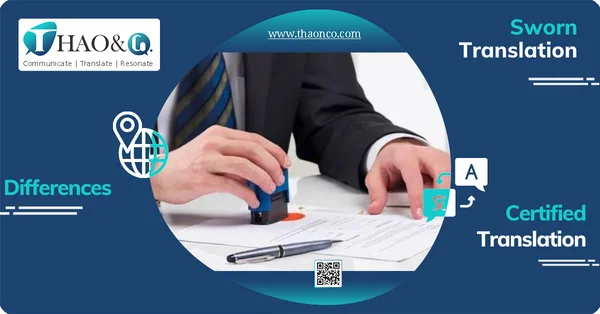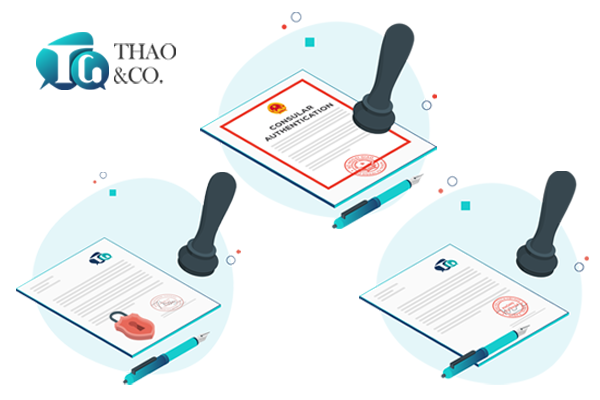Over the past years, the increasing global mobility and exchange have highlighted the importance of legal documents and related materials in the international screening processes. Additionally, such paperwork is required to obtain sworn translation or certified translation before being submitted to the receiving authorities of a foreign country for different purposes, such as immigrating, establishing an offshore business, or pursuing education abroad.
This increasing demand has thus led to the emergence of numerous sworn and certified translation service providers nowadays. Join Thao & Co. as we delve into the differences between these two easily mixed-up translation types, prior to settling on the best option for your paperwork.
These are the three main differences between the two types of translations.
Sworn translation covers the process of converting legal documents from the source language to the target language. This process is carried out by sworn translators, who have to swear an oath before a court, pledging to deliver their translations accurately and faithfully.
Sworn translations are only commonly applied in European countries that employ the Civil Law system, such as Spain, Italy, Germany, France, etc.
Despite sharing some characteristics with sworn translation, certified translation is essentially a different concept. For certified translation, a translator will first convert the assigned documents into the target language.
Then, the translator or the translation agency in charge will provide a certificate affirming the accuracy and completeness of the translation. Compared to sworn translations, certified translations are more widely used, as they deal with a broader range of documents for both legal and personal purposes.

The shared purpose of sworn translations and certified translations is to guarantee that the translated text is an accurate and faithful rendition of the source document. However, the requirements and regulations surrounding the two translation types will vary depending on each receiving authority or country.
Sworn translations are predominantly used for legal and administrative procedures conducted by government agencies. Hence, the absence of sworn translations for your documents could potentially lead to the denial of your request in these proceedings.
Here are some typical documents that frequently require sworn translations:
Unlike sworn translations, certified translations are not limited to legal paperwork but can encompass various types of documents. These documents are mostly used for personal or commercial purposes.
Documents that often require certified translation include:
Generally, both sworn and certified translations are required to be delivered by experienced linguistic specialists who can ensure the accuracy of their translation works. However, the specific requirements regarding the performers of each practice are not the same.
In terms of sworn translation, each country has its own set of requirements and regulations as to who can undertake this type of translation. In certain cases, only sworn translators legally recognized or authorized by the receiving authority or country can carry out sworn translations.
Sworn translators are linguistic experts who have sworn an oath before a court to deliver accurate translations. When the translation work is complete, these translators sign and place their seal on the translated documents, thus making them legally valid to be used in courts as evidence or for other purposes.
Certified translations, in most cases, are done by skilled translators or professional translation agencies. They are linguist professionals who possess an excellent command of the two languages involved and can produce impeccable translations.
Alternatively, it is also highly recommended that you entrust your documents to a reputable translation agency to guarantee precise and natural-sounding translations. Another benefit of partnering with a translation firm is that they can issue a Certificate of Translation Accuracy for the translations.
Especially at Thao & Co., we offer clients a complimentary certificate involving our clarifying statements, stamp, signature, and contact information for reference.
To carry out sworn or certified translations, translators are required to have the essential language skills and a solid knowledge base to guarantee the successful and precise translation of documents. Let’s look into some common challenges translators encounter while working with these types of translations.
Similar to any type of translation, the fundamental prerequisite is the absolute faithfulness of the converted information to the source text. Moreover, for documents requiring certified or sworn translations, precision becomes even more crucial as they are predominantly utilized for legal, administrative, and commercial purposes.
Any error or misinterpretation can result in severe consequences and overall hamper the paperwork processing procedure. Therefore, it is pivotal that sworn and certified translations are handled with scrupulous attention to meet the standards of accuracy required for official paperwork.
Furthermore, as previously mentioned, sworn translations are commonly employed in the legal sector. Therefore, translators must also ensure to deliver top-notch translations to guarantee the most satisfactory results for clients.
To accurately capture and deliver the essence of the original text, translators must possess more than just an excellent grasp of the languages involved, but a deep and specialized understanding of various fields. Especially when dealing with jargons, besides proficient linguistic skills, translators are also required to master industry-specific knowledge of the pertinent domain to be able to translate the technical terms accurately and appropriately.
Regarding sworn translations, since they are associated with legal regulations, the translators in charge must be well-versed in the law and have extensive experience working with legal papers. The stipulations and requirements for sworn translations differ across countries and regions. Sworn translators must therefore possess a profound comprehension of the associated legal systems to make sure the translations comply with the laws and regulations of the target countries.
Most certified or sworn translations are used for complex legal or administrative procedures. These procedures come with stringent deadlines for submission. Thus, make sure to inform your translation service provider of your submission deadlines so your translations can be carried out and delivered within the allotted timeframe.

Applied mainly in the realm of legal affairs, both certified and sworn translations demand a high level of accuracy in their content. For that reason, it’s advisable to thoroughly research different translation agencies before deciding where to trust to ensure that the translation products will align with both your expectations and the receiving entity’s requirements.
For years of active operation in the translation field, Thao & Co. has not only managed to uphold our reputation but also garnered great trust from clients. This is largely thanks to our unwavering commitment to improvement and the expertise of our team, which comprises skilled and experienced native linguist specialists.
Should you seek a reliable translation agency, we stand as the best match! Leveraging our professionalism and extensive experience, we can help you seamlessly navigate through the complexities inherent in the translation process. Choosing Thao & Co. as your language partner will unlock a host of benefits and conveniences, guaranteeing you an exceptional experience with our services.
For further information or a detailed quote for your translation project, please leave your contact information on the Get a Quote page, and we will promptly assist!